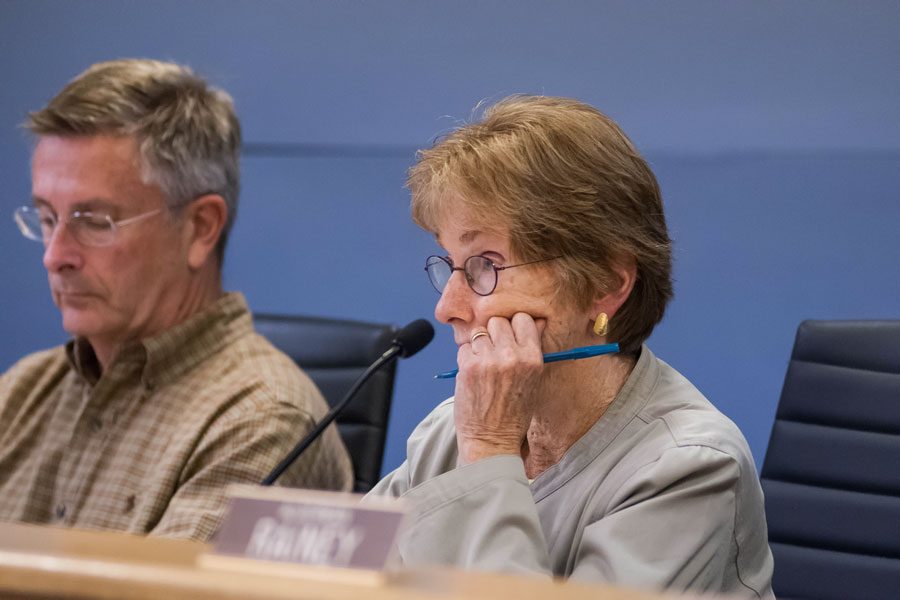Council holds vote on energy benchmarking ordinance
Lauren Duquette/Daily Senior Staffer
Ald. Eleanor Revelle (7th) attends Monday night’s Council meeting. Revelle originally urged the Council to vote on the benchmarking ordinance now rather than later, but agreed to hold the vote until November.
September 27, 2016
Aldermen voted on Monday to postpone a decision on an energy benchmarking ordinance that would require some Evanston property owners to submit utility bills to monitor energy usage.
At City Council on Monday night, aldermen debated the importance of the ordinance, which would require condominium, apartment and retail building managers to send their energy, water and other utility bills to the city using a U.S. Environmental Protection Agency’s program. Their buildings would be compared to ones of similar sizes and uses to allow managers and owners to benchmark their usage. The city could impose a fine if a property manager failed to submit their data.
City staff hopes with this ordinance that building owners and managers will be encouraged to lower energy and water usage.
The council voted to hold the ordinance in order to reach out to the business community and property owners to inform them of what their responsibilities may be if the ordinance is passed.
Ald. Melissa Wynne (3rd) said the ordinance is environmentally friendly and a necessary step to reduce Evanston’s carbon footprint. She added that past green ordinances and mandates to install energy-saving light bulbs and water-saving toilets seemed “burdensome and intrusive” at first, but now seem beneficial.
“This is really about not just saving individual property owners energy, but also helping to protect all of us,” Wynne said. “If we don’t take the first few steps, then who does? And for heaven’s sakes, Chicago’s already gone ahead of us on this one, and that’s not normal.”
Chicago passed their benchmarking ordinance for buildings 50,000 square feet and larger in 2013.
The Administration and Public Works Committee also held a vote on the ordinance in July after questioning its usefulness and penalties.
At the Monday meeting, several building managers also questioned the efficacy of the ordinance, saying they worried it would create an unnecessary hassle to collect bills from tenants and submit them to the city.
Eric Paset, owner of North Shore Apartments & Condos, Inc., said most property managers closely monitor their energy usage to minimize bills.
“No one’s opposed to saving energy,” Paset said. “Probably 20 percent of our gross income goes towards utilities. … But I think to put this ordinance in place, I feel like works against us. We can’t control what our tenants do.”
Proponents of the ordinance said the one drafted in Evanston is similar to laws already in place in Chicago, making it easier for building owners that have property in both cities to follow the Evanston regulations, as they are already operating under the Chicago ordinance.
Ald. Eleanor Revelle (7th), the former president of Citizens’ Greener Evanston, wanted to vote on the ordinance Monday night but agreed to hold the vote until November so aldermen could hear the concerns of business owners.
A few property managers who spoke at the meeting worried sharing bills with the city and comparing energy use between neighbors could be an invasion of privacy and even embarrassing. Revelle said shaming was not the point of benchmarking.
“I really don’t think we’re in this to try and shame people,” Revelle said. “We’re trying to get information so that we can then help them become more energy-efficient and really help them save money.”
Aldermen will vote on the ordinance at the Nov. 28 meeting.
Email: [email protected]
Twitter: @ericasnoww


